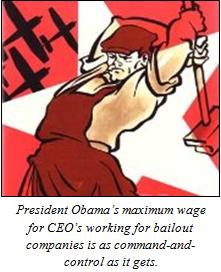By William Warren

Yet, this appears to be precisely the direction in which President Barack Obama is taking the country.
On Wednesday, the new President unveiled that he will be setting a $500,000 annual cap on the salaries of top executives at those companies and firms receiving bailout money from Washington. Seizing upon public disgust over recent corporate excesses and playing into the reckless notion that “corporate greed” triggered the financial calamity last fall—rather than rampant government ineptitude—Mr. Obama is emphatically “sticking it to the man.”
And he is “sticking it to the capitalist system” while he’s at it, with the sharp-edged sword of class warfare.
The President’s latest move constitutes yet another step the government has made far beyond its constitutional sphere of authority. The boundaries between Big Government and a truly free market were crossed a long time ago. And they are now fading further into the distance with each passing day and new directive.
First, the government props up struggling institutions that otherwise would have rightly failed or corrected themselves in a free market scenario. Then, having purchased huge shares in the companies, the government announces the need to dictate salaries and payroll. Thus is created a Marxist tautology.
And free market apologists are left to wonder: when does this madness end? Who decides the actual dollar amount top executives deserve? What will happen when Barack Obama decides that $500,000 is simply too “excessive”—or that it’s time to take a good, hard look at mid-level management salaries while he’s at it?
The actual financial repercussions of this move simply cannot be overstated. Nor can the threat to individual freedom.
By punishing the top executives at the nation’s largest and most influential companies, the President is effectively dissuading top-talent from seeking the reins of leadership. And the fact is, these companies need effective leadership now more than ever.
In addition to the obvious financial disincentives, the move to cap executive pay also propagates the false narrative surrounding the financial crisis itself. As the President said:
“This is America, we don’t disparage wealth. … What gets people upset, and rightfully so, is executives being rewarded for failure. Especially when those rewards are subsidized by U.S.”
The truth is, rather than “corporate greed” and “deregulation”, it was the U.S. Government’s loose dollar policy that sparked this conflagration. The over-regulation of mortgage giants Fannie Mae and Freddie Mac—as well as the Clintons, Dodds, and Franks—forcing these companies to hand out bad housing loans to unqualified recipients are what burst the housing bubble. Barack Obama and his congressional handmaidens are doing all in their power to conceal this truth and spread the myth of “corporate greed”. And when this fiction is accepted as fact, Mr. Obama’s dreams of even bigger government can become reality.
Unfortunately, Democrats are not the only villains in this story of Big Government run amok.
Many Republicans shoulder a large amount of the blame as well. For instance, House Minority leader John Boehner (R-OH) has come out in support of Barack Obama’s executive pay caps. As he says:
“I think if anybody is looking to the taxpayer to help bail their company out, these kind of executive compensation limits are appropriate.”
So, in an effort to “defend” the taxpayer, Rep. Boehner is willing to justify more Big Government—and inherently anti-taxpayer—intervention in the nation’s corporations. This is all too reminiscent of President Bush’s chilling claim last December in which he admitted that he had “abandoned free market principles to save the free market system.”
This logic is the equivalent of severing the wings to keep the airplane aloft or removing the brain to keep the heart beating. It does make an iota of sense. Like oil and vinegar, command and market economies do not mix.
When conservatives like John Boehner and George W. Bush take a wishy-washy, halfhearted approach to limited government, the Golden Goose has been seriously, if not mortally, wounded. For example, Treasury Secretary Tim Geithner said that he favored “extending at least some of the TARP provisions and features of the $500,000 cap to U.S. companies generally.” And according to Financial Week, and as noted on Mark Levin’s radio program, Congressman Barney Frank favors “compensation restrictions [that] would apply to all financial institutions and might be extended to include all U.S. companies.”
By giving an inch to these demagogues, Republicans run the risk that they will simply run roughshod over free markets and liberty, leaving nothing but poverty and regulation in their wake.
The bottom line is that Representative Boehner, his Republican allies, and the Democrats are all senselessly and shamelessly careening down the slippery slope of collectivist economic policies. And when America hits bottom, the economy may be crippled at best.
At least one Republican, Representative Mike Pence of Indiana, has managed to keep a level head throughout this vertiginous plunge. As he remarked:
“Maybe it is going to wake up American business—that there is a cost when you invite the 800 pound gorilla of government into your boardroom.”
Yes, while it may wake up the top brass of American business, it is far more crucial that it not permanently anesthetize the American people—which is clearly the hope of the class-envy obsessed Obama Administration.
The nightmare of a Soviet-style command economy in the United States is becoming increasingly tangible by the day. In his Communist Manifesto, Marx wrote, “Every class struggle is a political struggle.” Welcome to Professor Obama’s Class Struggle Politics 101.
William Warren is a contributing editor of ALG New Bureau.

